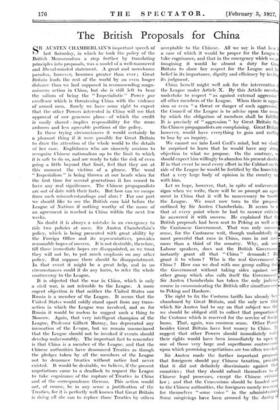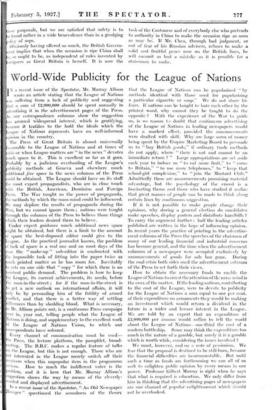The British Proposals for China
SR AUSTEN CHAMBERLAIN'S important speech of last Saturday, in which he took the policy of the British Memorandum a step further by translating piinciples into proposals, was a model of a well-mannered and liberal-minded statement. A great and unwelcome paradox, however, becomes greater than ever ; Great Britain leads the rest of the world by an even longer distance than we had supposed in recommending magn- animous action in China, but she is still left to bear the odium . of being the " Imperialistic " Power par excellence which is threatening China with the violence of armed men. Surely we have some right to expect that the other Powers interested in China will WC that approval of our generous plans—of which the credit is easily shared—implies responsibility for the more arduous and less agreeable portions of the policy.
In these trying circumstances it would certainly be a pleasant thing if it were possible for Great Britain to draw the attention of the whole World to the details of her case. Englishmen who arc sincerely anxious to recognize Chinese nationalism up to the limit to which it is safe to do so, and are ready to take the risk of even going a little beyond that limit, feel that they are at this moment the victims of a phrase. The word " Imperialism " is being thrown at our .heads when for the first time for several generations it has ceased to have any real significance. The Chinese propagandists arc out of date with their facts. But how can we escape from such misunderstandings and slurs ? For our part we should like to see the British case laid before the League of Nations if nothing worthy of the name of an agreement is reached in China within the next few weeks.
No doubt it is always a mistake in an emergency to ride two policies at once. Sir Austen Chamberlain's policy, which is being presented with great ability by the Foreign Office and its representatives, provides reasonable hopes of success. It is not desirable, therefore, till those immediate hopes are disappointed, as we trust they will not be, to put much emphasis on any other policy. But suppose there should be disappointment. In that event it might be a great help, and in no circumstances could it do any harm, to refer the whole controversy to the League.
It is objected that the war in China, which is only a civil war, is not referable to the League. A more cogent objection is that neither the United States nor Russia is a member of the League. It seems that the United States would coldly stand apart from any trans- action in which the League was involved, and as for Russia it would be useless to suggest such a thing to Moscow. Again, that very intelligent champion of the League, Professor Gilbert Murray, has deprecated any invocation of the Lengue, but we remain unconvinced that the League should not be invoked if events should develop unfavourably. The important fact to remember is that China is a member of the League; and that the Chinese authorities have denounced Treaties as though the pledges taken by all the members of the League not to denounce treaties without notice had never existed. It would be desirable, we believe, if the present negotiations came to a deadlock to request the League to take cognizance of the rupture of Treaties in China and of the correspondence thereon. This action would not, of course, be in any sense a justification of the Treaties, for it is perfectly well known that Great Britain is doing all she can to replace those Treaties by others acceptable to the Chinese. All we say is that here ' a case of . which it would be proper for the League te take cognisance, and that in the emergency which we a imagining it would be almost a duty for Cre Britain to show her respect for the League and 1 belief in its importance, dignity and efficiency by inviti its judgment.
China herself might well ask for the intervention the League under Article X. By this Article meinhe undertake to respect "as against. external aggression' all other members of the League. When there isaggres. sion or even "a threat or danger of such aggression,' the Council of the League is to advise upon the mem by which the obligation of members shall be fulfilled. It is precisely of " aggression " by Great Britain th the Chinese propagandists are complaining. Great Britain, however, would have everything to gain and nothing to lose by an inquiry. • We cannot see into Lord Cecil's mind, but we should be surprised to learn that be would have any stro objection to what we propose. On the contrary, se should expect him willingly to abandon his present doubts. If in that event he used every effort in the Cabinet on t side of the League he would be fortified by the knowledge . that a very large body of opinion in the country Ivas with him.
Let us hope, however, that, in spite of unfavourabk signs when we write, there will be so prompt an agree ment in China that it will be unnecessary to trouble the League. We must now turn to the proposah outlined by Sir Austen Chamberlain. It seems to a that at every point where he had to answer criticism he answered it with success. He explained that the British proposals had been sent to Peking as well as the Cantonese Government. That was only comma sense, for the Cantonese writ, though undoubtedly most powerful that runs in China, runs in not mu more than a third of the country. Why, ask so Labour speakers, does not the British Govermnen instantly grant all that " China " demands ? 13 grant it to whom ? Who is the real Government China ? How can we deal with one group calling it the Government without taking sides against son other group which also calls itself the Government Sir Austen Chamberlain has taken the only judicio course in communicating the British offer simultaneous to Peking and Hankow.
The right to fix the Customs tariffs has already be abandoned by Great Britain, and the only new di which Sir Austen had to say on that subject was that we should be obliged still to collect that proportion d the Customs which is reserved for the service of foreigo loans. That, again, was common sense. Other Pouts besides Great Britain have lent money to China. To suggest that other Powers should immediately wail's their rights would have been immediately to open II one of those very large and superfluous controversies upon which promising negotiations are too often =aka'.
Sir Austen made the further important proposals that foreigners should pay Chinese taxation, provided that it „ did not definitely discriminate against the. countries,; that they should submit themselves to J Chinese legal processes,- ekcept. the Chinese crimin law ; and that the Concessions. should be handed en to the Chinese authorities,- the foreigners merely reservi for themselves •" some voice "• in the administration Some misgivings have been aroused by the daring hese proposals,. but we are satisfied that safety is to. e found rather in a vide benevolence thin in a grudging lidiey of sops.
Obviously having offered so much, the British Govern- ment implies that when the occasion is ripe China -shall me, or ought to be, as independent of rules invented by oreigners as Great Britain is herself. It is now the task of the Cantonese and of everybody else who pretends to authority hi China to make the occasion ripe as soon as may be: If Mr. Chen, through bad judgment, or out of fear of his Russian advisers, refuses to make a solid and -fruitful peace now on the British lines, he will commit as bad a mistake as it is possible for a statesman to make.



























































 Previous page
Previous page